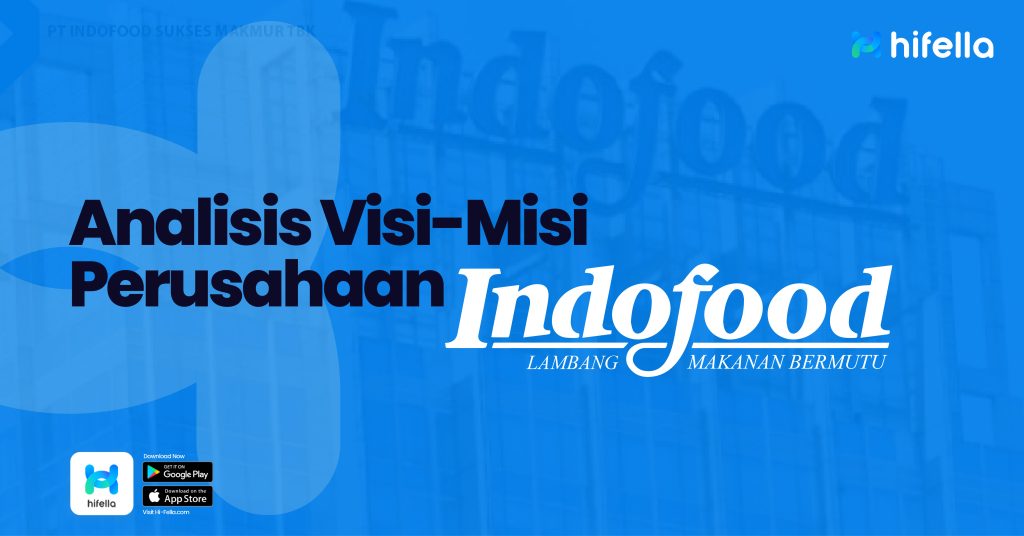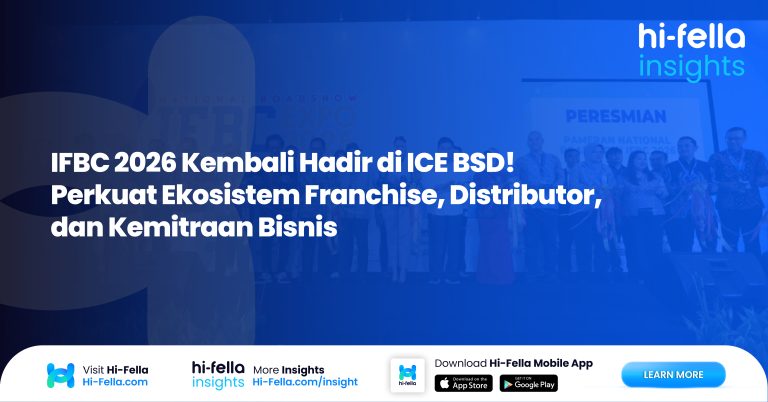Table of Contents
Berikut ini merupakan analisis visi misi perusahaan indofood yang dikenal sebagai salah satu pemain utama di industri makanan dan minuman.
Selain itu, pada artikel ini juga akan membahas sejarah perusahaan Indofood, strategi dan juga kinerja perusahaan ini. Simak selengkapnya!
Sejarah dan Perkembangan Perusahaan Indofood

Sumber: CNBC Indonesia
PT Indofood CBP Sukses Makmur Tbk., berdiri pada tahun 1971, merupakan bagian dari Salim Group. Dengan fokus awal pada pengolahan makanan dan minuman, perusahaan ini menetapkan standar tinggi dalam produksi makanan yang berkualitas, aman, dan halal, mencerminkan komitmen awal mereka terhadap kesehatan dan kepuasan konsumen.
Memasuki pasar internasional pada akhir tahun 1980-an, PT Indofood CBP Sukses Makmur Tbk. menunjukkan ambisi globalnya.
Penggabungan beberapa anak perusahaan pada tahun 1994, khususnya di bidang mie instan, menandai langkah penting dalam diversifikasi produk dan ekspansi perusahaan.
Analisis Visi-Misi Perusahaan Indofood
Sebelum menganalisis visi-misi perusahaan Indofood, berikut ini merupakan visi dan misi dari perusahaan ini yaitu sebagai berikut:
Visi Perusahaan Indofood
Dilansir dari website resmi Indofood, visi mereka yaitu menjadi “A Total Food Solutions Company”. Melalui visi ini, Indofood tidak hanya berambisi menjadi pemimpin dalam menyediakan produk pangan, tapi juga dalam menyajikan solusi lengkap yang berkelanjutan untuk kebutuhan pangan global.
Indofood juga tidak hanya berfokus pada volume produksi atau pangsa pasar saja, tetapi juga memberikan pengaruhnya terhadap standar industri, melakukan inovasi, dan kemampuan untuk mengikuti tren terhadap perubahan kebutuhan dan preferensi konsumen.
Salah satu contoh inovasi dan kemampuan untuk mengikuti tren konsumen dari perusahaan Indofood yakni sebagai berikut:
Dilansir dari Marketeers, PT Indofood melakukan inovasi terbaru termasuk kemasan pouch Freiss yang praktis, es krim Indofood rasa Indomie Goreng, dan produk Indomilk Korean series yang terinspirasi dari Hallyu Wave yang sedang naik daun di pasar Indonesia, serta seri premium Indomie dan Chitato Lite Aburi Seaweed yang unik.
Dari berbagai inovasi yang telah dilakukan oleh Indofood, menunjukkan bahwa komitmen mereka untuk terus berkembang sesuai dengan tren.
Misi Perusahaan Indofood

Sumber: KataData
1. Memberikan Solusi Berkelanjutan untuk Kebutuhan Pangan
Indofood berkomitmen untuk menyediakan solusi berkelanjutan bagi kebutuhan pangan. Hal ini berarti mengembangkan produk yang tidak hanya memenuhi kebutuhan nutrisi konsumen tetapi juga diproduksi dengan cara yang memperhatikan efisiensi sumber daya, minimisasi limbah, dan pengurangan jejak karbon.
Dengan fokus pada inovasi produk yang berkelanjutan, Indofood berupaya memastikan bahwa produksi dan distribusi pangan dapat memenuhi kebutuhan generasi saat ini tanpa mengorbankan sumber daya yang dapat mengancam generasi mendatang.
2. Terus Memperbaiki Sumber Daya Manusia, Proses, dan Teknologi
Indofood berinvestasi dalam pengembangan karyawan melalui berbagai pelatihan dan memastikan bahwa tim mereka dilengkapi dengan keterampilan yang diperlukan untuk menghadapi tantangan industri yang terus berubah.
Selain itu, perusahaan terus menerus mengoptimalkan proses operasionalnya dan mengadopsi teknologi terbaru untuk meningkatkan produktivitas dan mengurangi dampak lingkungan.
Dengan pabrik yang tersebar di seluruh nusantara, Indofood menerapkan standar produksi dan operasional yang ketat untuk memastikan bahwa setiap produk yang dihasilkan memenuhi, bahkan melebihi, harapan konsumen dan standar industri.
Implementasi sistem manajemen kualitas ISO dan sistem manajemen keamanan pangan HACCP di seluruh unit produksi merupakan bukti nyata dari komitmen Indofood terhadap kualitas dan keamanan.
Sertifikasi ini bukan hanya sekedar pencapaian, tetapi lebih merupakan refleksi dari proses pengawasan kualitas yang berkelanjutan dan komitmen Indofood untuk memproduksi makanan yang aman, berkualitas tinggi, dan halal.
Sertifikasi ini juga menandai komitmen Indofood dalam menerapkan praktik terbaik dalam setiap aspek produksinya, dari pemilihan bahan baku hingga proses distribusi.
Informasi Tambahan
Dilansir dari Badan Standarisasi Nasional, PT Indofood CBP Sukses Makmur Tbk telah mendapat akreditasi SNI ISO/IEC 17025:2008 dari Komite Akreditasi Nasional (KAN) sejak tanggal 21 September 2016, menandakan kompetensi laboratorium Quality Assurance, Food Ingredients Division mereka secara internasional.
Pengakuan ini menunjukkan laboratorium mereka memenuhi standar global dalam pengujian dan kalibrasi, menegaskan komitmen Indofood terhadap kualitas dan keamanan produk.
Manajer Quality Assurance, Nora Giat, menyatakan ambisi untuk terus meningkatkan parameter pengujian, sementara Sulianto Pratama, Kepala Food Ingredients Division, berharap akreditasi ini akan mendukung ekspor.
Bambang Prasetya dari KAN menjelaskan bahwa akreditasi ini memungkinkan hasil pengujian Indofood diakui secara global, memfasilitasi perdagangan internasional.
PT Indofood juga meresmikan pabrik baru yang diharapkan meningkatkan kapasitas produksi dan kualitas produk, sambil terus memperluas jangkauan ekspor ke 103 negara.
3. Berkontribusi pada Kesejahteraan Masyarakat dan Lingkungan
Komitmen Indofood terhadap kesejahteraan masyarakat dan lingkungan mencerminkan bahwa kesuksesan jangka panjang perusahaan bergantung pada kondisi lingkungan dan juga kesehatan masyarakat.
Inisiatif CSR mereka yaitu seperti program pemberdayaan petani, pengelolaan sumber daya alam yang berkelanjutan, dan proyek konservasi, adalah beberapa cara Indofood memberikan kontribusi positif di kalangan masyarakat.
Melalui pendekatan ini, perusahaan berupaya untuk menciptakan nilai yang berkelanjutan tidak hanya bagi bisnisnya tetapi juga untuk masyarakat luas.
4. Terus Meningkatkan Value bagi Stakeholders
Misi untuk terus meningkatkan nilai atau value bagi para stakeholders menegaskan bahwa Indofood berusaha untuk menciptakan manfaat ekonomi, sosial, dan lingkungan yang maksimal.
Ini melibatkan dialog yang berkelanjutan dengan stakeholders untuk memahami kebutuhan dan ekspektasi mereka, serta bekerja untuk mengatasi tantangan melalui inovasi dan praktik yang berkelanjutan.
Dengan demikian, Indofood berusaha untuk membangun kepercayaan dan hubungan jangka panjang dengan konsumen, karyawan, investor, dan masyarakat.
Kesimpulan
Secara garis besar, analisis visi misi perusahaan Indofood akan terus menjadi alat evaluasi yang penting untuk memastikan bahwa perusahaan tetap pada jalur yang benar menuju kesuksesan jangka panjang.
Kesimpulannya, PT Indofood CBP Sukses Makmur Tbk. telah menunjukkan bagaimana sebuah perusahaan dapat berkembang dan mempertahankan posisinya sebagai pemimpin pasar melalui pelaksanaan visi dan misi yang kuat.
Dengan terus menerapkan prinsip-prinsip ini dalam setiap aspek operasionalnya, Indofood tidak hanya mencapai kesuksesan bisnis tetapi juga memberikan kontribusi positif kepada masyarakat dan lingkungan.








